Athens welcomed more than 7 million tourists in 2023 and this year this number is expected to increase by 20%, according to experts, but this unbridled growth is not without causing harm to residents and the environment.
Like all major tourist destinations, Athens is not immune to the consequences of mass tourism. On the one hand, the figures are prosperous: the country’s GDP is increasing, as are tax revenues.
On the one hand, voices are being raised to react to the exhaustion of the city’s reception capacity and its lack of infrastructure. Not to mention the consequences for the environment in terms of water management, sanitation and waste produced by the tourism industry.
Faced with this dilemma, and the anger of the inhabitants, such as that recently observed in the Spanish Canary IslandsAthens is looking for a solution. A few years ago, the goal was to welcome tourists all year round and make Athens a final destination, not just in summer. The goal has now been achieved, but at what cost?
“We need rules”, says Katerina Kikilia, professor of tourism management at the University of West Attica in Athens.
“This is the scourge of recent years, Athenians are confronted with it in their daily lives, the main effects are felt on society and the environment, but there are also partial effects. “The main problem of society and the state is housing”Ms Kikilia tells euronews, adding that many areas of Athens and Attica in general have been dedicated to the tourist industry. A very typical example, as Professor Kikilia says, is Koukaki, “a beautiful neighborhood that has been transformed into a large short-term rental area, a place to welcome foreigners, there are no other families there, no students in the schools.”
Ms. Kikilia adds that the hotel infrastructure has developed a lot in recent years, but that other infrastructures have not followed and that we now need to catch up.
Rental prices have soared in Athens neighborhoods, especially those close to the metro, which is popular with tourists. It’s all about supply and demand, says Antonis Markopoulos, co-founder of Posperty.
“If someone talks about renting, it is true that there is a big problem with the supply of real estate.Because the demand for rents is five times greater than the supply.”
To combat the negative effects of short-term rentals, leading to a scarcity of rentals for residents, many initiatives, sometimes drastic, have been adopted in Europe while others European cities tackle pollution and coastal erosion related to cruise ship traffic.
And Athens? The Greek capital wants to go further and is considering a more global approach.
“All these tourist efforts do not mean much financially for the city. Just consider that each visitor brings the city 0.4 euros each, and not each day, in total. But we have not received this money, even though it is July. What I mean by this is that we must find a way to make tourism sustainableso that it does not create a further reinforcement of inequalities in the city”Athens Mayor Haris Doukas told euronews, while stressing that a study was currently underway to consider what measures to take.
This will include assessing the destination’s accommodation capacity indicators, spatial analysis of data on short-term rentals and hotel units, analysis of tourist flows, the dynamics of “municipal apartments” and the challenges of managing them effectively.
One of the interventions already proposed by the municipality is accommodation tax and sustainabilitywhich reaches 10 euros in five-star hotels, which customers must pay as in many other European countries “so that we can build infrastructure”, explains the mayor of Athens.
However, “of the 10 euros that tourists give per day to five-star hotels, nothing is currently returned to the municipality,” regrets the chief magistrate of the Greek capital. He also stresses, among other things, that a presidential decree should be signed immediately with which, on the basis of science, of the figures of the study on the reception capacity, the municipality would be able to manage the tourist product according to oversaturated areas and other places where we can send them.

